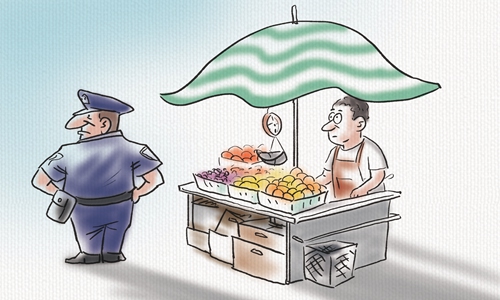Allowing more poor vendors should be NYC no-brainer
By Rong Xiaoqing Source:Global Times Published: 2020/6/11 14:23:40

Illustration: Liu Rui/GT
Amid the protests against police brutality and racism triggered by the killing of George Floyd, many local governments in the US are looking at ways to reform policing. Among the initial plans, New York City Mayor Bill de Blasio announced a proposal on Sunday to remove the power to enforce street vending laws from the local police department.This came as a surprising gift for New York's 20,000 street vendors who have been suffering iron-fist enforcement from the police.
Elsa Morochoduchi, an immigrant from Ecuador, typified this treatment. Late last year, she was handcuffed when she was selling churros in a subway station, The New York Times reported in November 2019.
Vendors are not allowed to operate in subway stations and Elsa didn't have a license.
But the video showing police officers grabbing a pushcart from her and detaining a sobbing immigrant struggling to make ends meet and selling harmless comfort food triggered an outcry in the city. People gathered to protest, and Elsa's pushcart was returned to her.
Elsa is only one of numerous street vendors who have encountered such treatment from law enforcement.
Almost all street vendors I know have their own horror stories with the police. A man selling figures made of grass said he often received tickets for reasons he couldn't comprehend. A woman selling home decorations was arrested just because she was trying to videotape a police officer writing her a ticket for what she deemed ridiculous reasons.
In 2007, Dong Hechou, a Chinese immigrant making a living on the streets of Chinatown by selling his calligraphy, argued with police officers who were trying to issue him a ticket. The conflict soon escalated and the police started to beat Dong with their batons. Dong hit a moving police patrol car while he was trying to flee and smashed a bone in his right leg. The case was settled two years later with the city compensating Dong $65,000.
There is nothing wrong with police enforcing laws. After all, that is a large part of their job. But the tactics they deploy often seem like they are more suitable for dealing with violent criminals than with frightened street vendors. And the fact that the majority of street vendors are immigrants makes the practice riskier amid the rage against police brutality in the wake of Floyd's death. Many street vendors complain that police target people of color while they ignore white vendors for the same violations.
The deeper argument is that it brings the police into conflicts, and sometime brutal conflicts, with generally very harmless people they are supposed to protect and serve. The ultimate example of this was the police killing of a black cigarette vendor Eric Garner in 2014 on Staten Island in New York. He died after being put in a chokehold by a cop for allegedly committing a very minor misdemeanor - the illegal selling of cigarettes on the street. A violent death for that kind of offense should shock all with any sense of humanity.
The New York City mayor's plan doesn't mean that vendors will live a worry-free life from now on. The enforcement of vending rules will be entrusted to civilian city agencies, which may conduct fewer arrests but may not necessarily issue fewer tickets. Before the city raises the cap on street vendor licenses, many vendors will have to remain in the shadows.
The city capped the number of general merchandise vending licenses by law in 1979. The cap for year-round licenses was set at 853. Since 1983, the number of street food vendor permits has been capped at about 4,000, according to reports. New York City's population has increased fast since 1980, but the caps have not changed. The waiting lists for new licenses have been closed for years.
For new vendors, there are basically only two options. You can rent a license on the black market which not only costs tens of thousands of dollars, but this also means you should have the license holders working alongside you as the license is not allowed to be transferred. Or you can trade without a license, a crime that could mean a $1,000 penalty and up to three months in prison.
In 2014, a woman in Chinatown named Yin Chun gained unwanted fame because of the rigid law - she was allegedly arrested multiple times around the Chinese lunar New Year as she was using her husband's license. He couldn't accompany her because he was recovering from a stroke.
The city has kept the street vending laws draconian thanks to mainly the pressure from brick and mortar businesses who complain street vendors compete against them for customers without having the high rent overheads they face. But with the economy hit hard by the pandemic, it may be time for New York City to reconsider cap levels for vendor licenses.
In April, the Wall Street Journal reported that New York City's Independent Budget Office estimates the city will lose close to 500,000 jobs by March 2021. Street vending is a handy way for people who lose their jobs to maintain an income. As for the competition with brick and mortar stores, it can be curbed by limiting street vendors to areas where there are few shops. Many of those stores are likely to close in the recession anyway.
Helping the very basic level of independent entrepreneurs among minority communities should frankly be a no-brainer for a city that claims to be the most diverse and tolerant in the world - and built by immigrants. And in a world where budgets are going to be strained, making a few more dollars by selling more licenses will help pay for essential services.
The author is a New York-based journalist and Alicia Patterson fellow. rong_xiaoqing@hotmail.com
RELATED ARTICLES:
Posted in: VIEWPOINT,OPINION